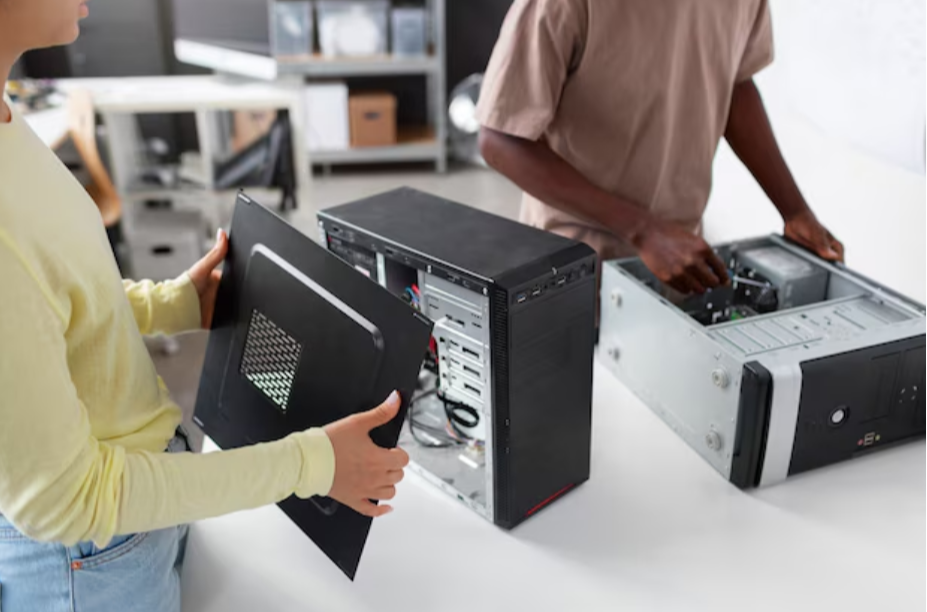
Why APC UPS Systems Are a Must-Have for Every Kenyan Business
Electricity cuts aren’t rare occurrences. That’s just how it is sometimes. You could be in the middle of a client meeting or printing an urgent invoice, and bam, everything goes dark. Not for five seconds. Sometimes for hours. And that short moment? It can wipe out more than just your screen. It disrupts work, damages machines, and in some cases, takes away trust.
For a lot of businesses, that’s all it takes to fall behind in daily work life.
That’s where APC UPS comes in. It doesn’t just give power. It gives time. Time to breathe, to save, to finish. A window between failure and safety.
What It Actually Does (And Why That Matters)
So, here’s the thing. A UPS isn’t some shiny gadget people buy for looks. It’s one of those tools you only appreciate after it saves you from outages, like airbags.
An APC UPS does a few basic but crucial things:
- It keeps your system running during a blackout.
- It stops sudden surges from frying your motherboard.
- It gives you a minute or several to wrap things up.
Most setups? Just need enough time to click save or shut down properly. That short pause is the difference between a clean close and a corrupted file. And if you’ve ever lost data, you’ll know how that feels. Irritating. Expensive. Avoidable.
It’s Always the Small Things That Break First
Not every outage is dramatic. Sometimes, it’s a flicker. Just enough for your modem to cut. Or your POS system freezes. Or your CCTV to miss those ten seconds that mattered.
You’d be surprised how often it happens. Power cuts are one thing, but drops in voltage, dirty power, weird little current shifts? These eat into your devices quietly. They don’t break things all at once. They just wear them down, until one day… click. Nothing.
That’s why most Kenyan businesses that run long hours or depend on computers—or even a decent Wi-Fi connection—end up turning to APC UPS eventually. It’s not flashy. But it works. And keeps working.
The Day Things Just Stopped
Quick story. There’s an internet café near Eldoret. Runs about 10 machines, does printing, scanning, the usual. One day, a power cut hit midday. The UPS they had wasn’t APC. Cheaper one. Everything just… shut off. One customer lost their school application form. Another lost hour of work. The café got blamed.
A few weeks later, they installed APC units. Different story now. When power dips, systems keep going. Clients barely notice.
Is that peace of mind? Or protection? Probably both.
Why APC?
People ask why APC and not something else. Honestly? Because it’s one of the few brands where you can forget it’s even there. That’s a good thing.
- It doesn’t beep too much.
- It doesn’t crash randomly.
- The battery indicators make sense.
- And when the battery does need changing, it tells you.
That kind of reliability is boring, yes. But when it comes to power backup, boring is exactly what you want.
Where It Helps Most
You don’t need to be a tech company to need stable power. In fact, it’s usually the smaller setups that suffer more.
- Shops lose sales when billing stalls.
- Schools freeze up during online lessons.
- Clinics can’t pull up records.
- Construction offices lose connection mid-call.
Even a two-person team with a printer and a laptop gets hit. It doesn’t matter how small the setup is—when power goes out, everything pauses.
Unless you’ve got a buffer. That’s what APC UPS is. A buffer. Not forever, just long enough.
Sizing It Right
A mistake people make? Buying whatever’s cheapest without checking what it can handle. That’s how you end up with a UPS that screams, flashes, and dies in a year.
Different workspaces need different sizes. Rough ideas:
- 650VA: For one desktop and a router.
- 1000VA: Two or three machines, maybe a monitor.
- 1500VA+: Bigger setups, maybe a file server.
Don’t plug in everything. Skip the printer. Leave out fans. Focus on essentials—your modem, router, maybe a main machine.
What Happens Without One?
Let’s be honest. Most offices in Kenya already know the drill. You try to work through it. You rely on the building generator. You tell yourself, “just a few minutes.” Sometimes that works. But not always.
Ever tried recovering a corrupted Excel sheet? Or explaining to a client why their file’s gone? It’s awkward. Stressful. And often completely preventable.
UPS doesn’t fix the grid. But it buys time. That’s really all you need.
See Also: Is AI Image Editing as Accurate as Traditional Photoshop Techniques?
Think Long-Term
You don’t need to be a tech guru to understand this. If your work depends on electronics—and most jobs do—you need a safety net.
And APC UPS isn’t a big investment. In fact, it’s cheaper than replacing a fried desktop. Or fixing a CCTV system that’s been rebooted one too many times.
Some tools just make sense once you’ve needed them. Unfortunately, most realise this only after they’ve lost data or gear. That’s a lesson you don’t want to learn the hard way.
Wrap-Up
APC UPS isn’t about luxury. It’s not a “nice-to-have.” For many Kenyan businesses, it’s the only reason things stay up and running.
Whether you’re running a shop, a law office, a small lab, or just trying to keep a stable Zoom call, it’s one of those purchases that quietly earns its keep.
You don’t notice it while it works. And that’s kind of the point.




